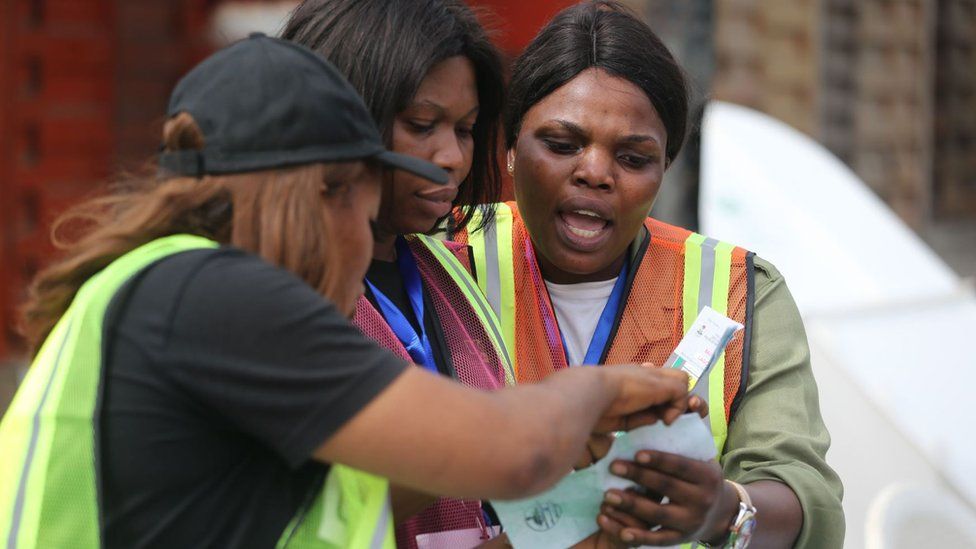The first results are expected later from Nigeria’s tightest election since the end of military rule in 1999.
However, following widespread delays and some attacks on polling stations on Saturday, voting has been postponed until Sunday in parts of the country.
In other areas, voting continued through the night.
Turnout appears to be high, especially among young people who make up about a third of the 87 million eligible voters.
This makes it the biggest democratic exercise in Africa.
The election has seen an unprecedented challenge to the two-party system that has dominated Nigeria for 24 years.
Peter Obi from the relatively unknown Labour Party, Bola Tinubu from the ruling All Progressives Congress (APC) and Atiku Abubakar of the main opposition Peoples Democratic Party (PDP) are all seen as potential winners. There are 15 other presidential candidates.
Saturday’s voting was marred by long delays at polling stations, as well as scattered reports of ballot-box snatching and attacks by armed men, especially in southern areas, where Mr Obi has his support base.
Dr Nkem Okoli was just about to vote in the Lekki district of the biggest city Lagos when masked men attacked the polling station.
“There was pandemonium. There were bottles flying everywhere,” she told the BBC. “They broke [the ballot box]. They stole the phones of the officials. Now we can’t vote.”
The mood at Nigeria’s polls in 60 seconds
In at least five states, voting in some places did not begin until around 18:00 local time – three-and-a-half hours after polls were due to close.
One woman on Twitter said she used her car headlights to light up the process of voting and counting.
There is tension in parts of Rivers and Lagos states, where some political parties have asked their members to go to the centres where votes are being collated, to prevent them from being manipulated.
There have also been complaints over the use of the recently introduced electronic voting system, with many voters accusing electoral officials of refusing to upload the results at the polling units as they are supposed to.
However, in those areas where voting went smoothly, results are already being posted outside individual polling stations.
These results from tens of thousands of polling stations around the country will then be added up. An official from the electoral body in each of Nigeria’s 36 states will then travel to the capital, Abuja, where the results will be announced state-by-state, with the first announcements expected later on Sunday.
Final results are not expected before Monday at the earliest, and possibly not until Wednesday.
At a press briefing on Saturday, electoral chief Mahmood Yakubu apologised for the delays in voting.
Mr Yakubu also said that armed men had attacked some polling units in the southern state of Delta and the northern state of Katsina, where voter-card verification machines were carted away.
They were subsequently replaced and security boosted to allow voting to take place, he added.
In the north-eastern state of Borno, Mr Yakubu said that militant Islamists had opened fire on electoral officers from a mountaintop in the Gwoza area, injuring a number of officials.

The lead-up to the polls was overshadowed by a cash shortage caused by a botched attempt to redesign the currency, leading to widespread chaos at banks and cash machines as desperate people sought access to their money.
The new notes were introduced in order to tackle inflation, and also vote-buying. On the eve of the election a member of the House of Representatives was arrested with almost $500,000 (£419,000) in cash, and a list of people he was supposed to give it to, police say.
Whoever wins will have to deal with a crumbling economy, high youth unemployment, and widespread insecurity which saw 10,000 killed last year.
Voters also cast their ballots for 109 federal senators and 360 members of the house of representatives, with another vote for state governors in March.
Who are the main candidates?
Mr Obi, 61, enjoys fervent support among some sections of Nigeria’s youth, especially in the south.
Although he was in the PDP before then, he is seen as a relatively fresh face. The wealthy businessman served as governor of the south-eastern Anambra State from 2006 to 2014. His backers, known as the “OBIdients”, say he is the only candidate with integrity, but his critics argue that a vote for him is wasted because one of the two traditional parties is more likely to win.
Instead, the PDP, which ruled until 2015, wants Nigerians to vote for Mr Abubakar, 76 – the only major candidate from the country’s mainly Muslim north.
He has run for the presidency five times before – all of which he has lost. He has been dogged by accusations of corruption and cronyism, which he denies.
Most of his career has been spent in the corridors of power, having worked as a top civil servant, vice-president and a prominent businessman.
Most people consider the election a referendum on the APC, which has overseen a period of economic hardship and worsening insecurity.
Its candidate, Mr Tinubu, 70, is credited with building Nigeria’s commercial hub Lagos, during his two terms as governor until 2007.
He is known as a political godfather in the south-west region, where he wields huge influence, but like Mr Abubakar, has also been dogged by allegations of corruption over the years and poor health, both of which he denies.
A candidate needs to have the most votes and 25% of ballots cast in two-thirds of Nigeria’s 36 states to be declared the winner.
Otherwise, there will be a run-off within 21 days – a first in Nigeria’s history.